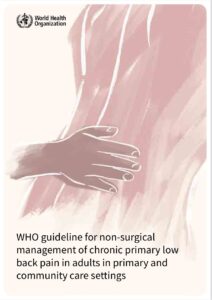 We are pleased to bring you some huge news for the chiropractic profession and the wider MSK community.
We are pleased to bring you some huge news for the chiropractic profession and the wider MSK community.
Yesterday, the World Health Organisation (WHO) launched its new Guideline for the Non-Surgical Management of Chronic Primary Low Back Pain in Adults in Primary and Community Care Settings, which provides evidence-informed recommendations on non-surgical interventions for chronic primary LBP (CPLBP), to improve CPLBP-related health and wellbeing outcomes. The Guideline Development Group included chiropractors and received evidence commissioned by WHO, from sources including the World Federation of Chiropractic’s Research Committee Chair, Dr Sidney Rubinstein, who led three of the systematic reviews informing the guideline recommendations.
Some of the recommendations made in the Guideline include:
- Spinal manipulation was one of the physical therapies recommended for use in all patients, as well as physical therapies such as, dry needling, a structured exercise program and massage.
- Structured and standardised education and advice were also part of the key management recommendations, as was cognitive behavioural therapy.
- TENS, therapeutic ultrasound, traction and lumbar braces/supports were all found not to be of value, with recommendations against their use.
- The Guideline was also scathing of most forms of commonly used pharmacological interventions, with only non-steroidal, anti-inflammatory medication receiving a conditional recommendation.
- Opioids, benzodiazepines, antidepressants, anticonvulsants, muscle relaxants, cannabis-related preparations and paracetamol (acetaminophen) all received the thumbs-down, with explicit guideline advice not to use or recommend.
- The Guideline was supportive of the use of multicomponent biopsychosocial interventions, repeatedly advocated by the WFC, and presenters at the launch repeatedly stressed the value of shared decision-making and the need to acknowledge patient needs, preferences and context.
Commenting on the launch of this important document, BCA President Tim Button, said: “Its wonderful to see the new World Health Organisation guidelines regarding Non-Surgical Management of Chronic Primary Low Back Pain in Adults in Primary and Community Care Settings. These heavily endorse EPIC (evidence-based, people-centered, interprofessional and collaborative) pillars. The guidelines reflect our own ethos and values around people-centered care, which is at the core of the BCA and what it means to be a BCA chiropractor.”
WFC Secretary-General and Past BCA President, Richard Brown, commented, “This important WHO Guideline is a strong endorsement of what many evidence-based chiropractors do in their clinics and offices around the world, every single day.
The WFC is particularly pleased to see a powerful endorsement of a biopsychosocial approach to spinal pain and disability, the importance of rehabilitation and interventions for which chiropractors are specifically trained, included in this guideline.
Chiropractors have consistently high levels of patient satisfaction as a consequence of strong, empathic communication, a hands-on approach, their use of exercise and lifestyle advice, and their support for interprofessional and collaborative care models. The recommendations in this Guideline provide a strong case for Member States to consider integrating chiropractic within health systems at high-, middle- and low-income levels.”
The BCA welcomes this new Guideline as a huge step forward in recognising person-centred, evidence-informed MSK healthcare which is what the BCA and its members stand for. We look forward to continuing our work in supporting every member to put patients first and fulfilling our Vision for chiropractic to be integral to UK healthcare.
Image Source: World Health Organisation
Information Source: World Federation of Chiropractic
